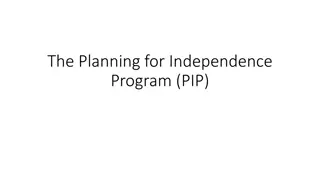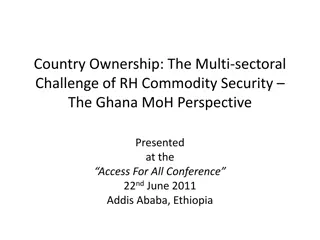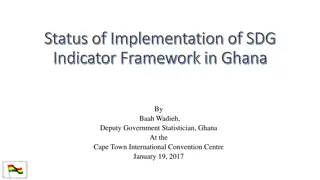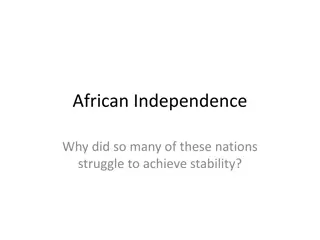Economic Planning in Ghana: Pre & Post Independence
Evolution of economic planning in Ghana before and after independence, highlighting key plans and the impact of decision-making on the country's development. Learn about Dr. Regina O. Adutwum's role in shaping Ghana's economic future.
Download Presentation

Please find below an Image/Link to download the presentation.
The content on the website is provided AS IS for your information and personal use only. It may not be sold, licensed, or shared on other websites without obtaining consent from the author.If you encounter any issues during the download, it is possible that the publisher has removed the file from their server.
You are allowed to download the files provided on this website for personal or commercial use, subject to the condition that they are used lawfully. All files are the property of their respective owners.
The content on the website is provided AS IS for your information and personal use only. It may not be sold, licensed, or shared on other websites without obtaining consent from the author.
E N D
Presentation Transcript
Is ECA Building Capacity for National Development Planning in Africa Isatou Gaye Capacity Development Division EGM | Urban Lens in Development Planning 13 December, 2017 Addis Ababa, Ethiopia 1
ECA CONTENT 1. Introduction 2. Development planning in Africa 3. Development planning imperatives 4. ECA Capacity Development Strategy 5. Development Planning and Statistics UNECA.ORG
ECA INTRODUCTION Development planning provides a systematic approach to identifying, articulating, prioritizing and satisfying the development aspiration of a country within a given resource envelope Steps include data generation and analysis; plan design and elaboration; plan implementation; monitoring, evaluation and reporting; mobilizing and allocating resources Ensures vertical coherence among the different planning frameworks at different government levels and horizontal coherence across sectors Promotes alignment with budget processes Planning is thus essential for achieving a country s development vision and objectives in a coherent and integrated manner UNECA.ORG
ECA Development planning in Africa 1960s 1979: development planning played a central role in driving Africa s development agenda 1980- 1999: Structural Adjustment Programmes Macroeconomic stability, privatization, economic liberalization Downsizing of public institutions, drastic reduction of spending Complete abandonment of planning 2000s: Poverty Reduction Strategies Debt relief as an incentive for poverty reduction More focus on government investment in social sector; less on productive capacities or economic transformation Externally driven, little country ownership UNECA.ORG
ECA Development planning in Africa 2000s: Gradual resurgence of development planning Shift from traditional, top-down economic growth-based models To a more broad-based approach with emphasis on bottom-up planning Mix of State and market-based approaches- articulated economy and inclusive society Increasingly embracing the sustainable development paradigm Integrating regional and global sustainable development frameworks Agenda 2063 and Agenda 2030 & the SDGs Strengtened statistical systems to support development planning Accurate and robust data for evidenced based policy making UNECA.ORG
ECA Development planning imperatives Demonstrated political will and leadership Strong institutions Legal and regulatory frameworks Awareness and citizens engagement Coordination and collaboration mechanisms Analytical and technical capacity Policy development and implementation Mainstreaming Integrated assessments Scenario setting and forecasting UNECA.ORG
ECA Development planning imperatives Analytical and technical capacity Monitoring, evaluation and reporting generation of accurate, timely and relevant data disaggregation of data and analysis Production of statistics Means of implementation Financing Technology & Innovation Capacity building UNECA.ORG
ECA Capacity Development Strategy Objective: To strengthen the capacity of member States, AU, RECs and other pan-African institutions to promote and achieve sustainable and inclusive growth, and to accelerate structural transformation Services: Promote evidence-based policy and programme formulation HLPD Offer strategic policy choices and solution paths for implementation Strengthen the capacity of institutions and members States Support high impact initiatives for regional integration Deliver knowledge and facilitate knowledge sharing 8 UNECA.ORG
ECA Capacity Development Strategy: Architecture ECA ECA s Capacity Building Architecture Targeted policy research Knowledge delivery to Member States, African regional and subregional organizations UNECA.ORG
ECA ECA Capacity Development Strategy: Key thematic areas Development planning and statistics Economic and social development Governance, Peace and Security Gender Tech & Inno Regional integration and infrastructure Natural resources and sustainable development UNECA.ORG
ECA ECA Capacity Development Strategy: Main Actors Capacity Development Division Strategic Partners: AUC, AfDB, UNDESA, UNCT All ECA Divisions ECA Subregional Offices and African Institute for Economic Development and Planning UNECA.ORG
ECA ECA Capacity Development Strategy: Delivery Chain Member State addresses formal request for support to ECA ES ES Scoping Mission undertaken Action Plan implemented Action Plan formulated assigns Division UNECA.ORG
ECA Development Planning and Statistics Objective: To improve public sector management and development planning in support of economic and social transformation in Africa Expected accomplishments: Strengthened capacity of member States for better development planning, formulation of policies and approaches Enhanced capacity of ECA member States for better policy formulation, analysis and management Services and activities: Build capacity on development planning at national, subregional and regional levels Promote institutional strengthening and evidence based policy making Advisory services and technical assistance; dialogue and knowledge sharing; frameworks and guidelines; strengthening partnerships UNECA.ORG
ECA Development Planning and Statistics ECA has a long standing experience of supporting member States, regional and subregional institutions in the design and articulation of development planning frameworks Involves SD mainstreaming and strengthening statistical capacity for evidenced based policy making Employs an integrated and coherent approach through effective inter-divisional cooperation and substantive partnerships Support is demand driven and takes into account equitable geographical distribution and language considerations Countries need to develop comprehensive capacity development strategies to ensure that support is country owned and led UNECA.ORG
Development Planning and Statistics ECA Area of support Countries Developing planning frameworks and/ or their alignment with Agenda 2063 and the SDGs Benin, Burkina Faso, Cameroon, Congo, Ethiopia, Guinea Conakry, Ivory Coast, Morocco, Niger, Nigeria, Sudan, Togo, Uganda, Zambia Integrating Accountability in Development Planning Benin, Cameroon, Egypt, Kenya, Zambia Elaboration of National Strategies for the Development of Statistics, and strengthening national statistical systems Burkina Faso, Cape Verde, Gabon, Guinea Bissau, Guinea Conakry, Egypt, Liberia, Mauritania, Nigeria, Senegal, South Sudan UNECA.ORG
ECA THANK YOU! UNECA.ORG























